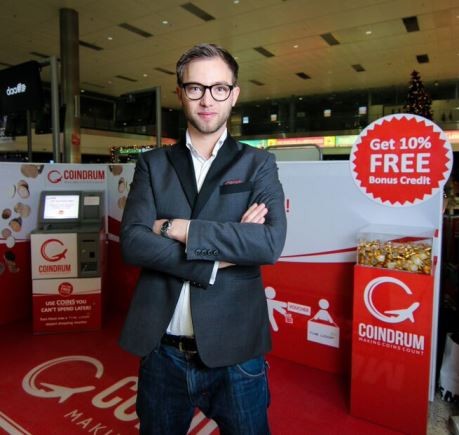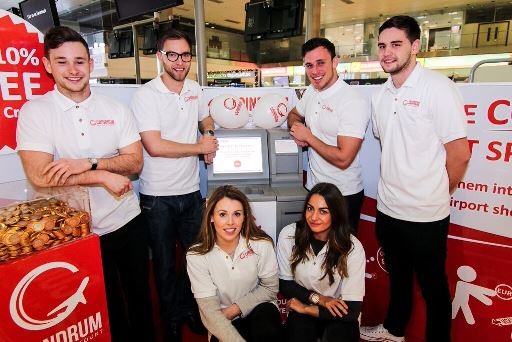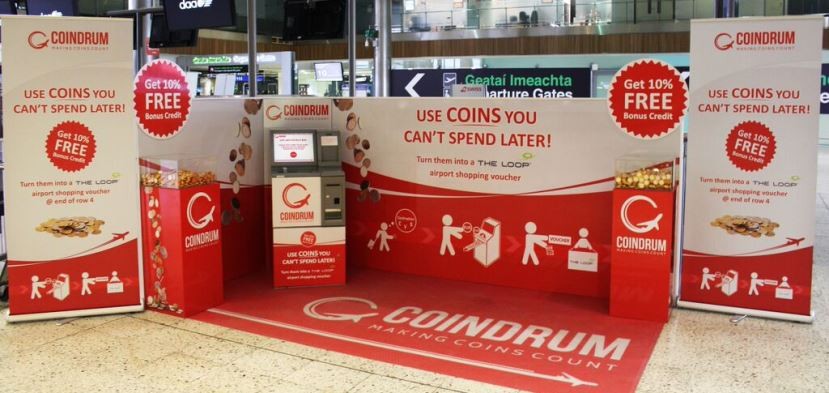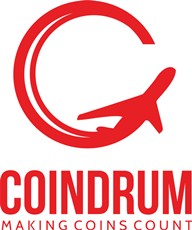"Coindrum operates self-service machines in airports that passengers use to convert unwanted coins into duty free retail vouchers, especially when departing to different currency countries."
 Hi Lukas and welcome to our inspiring startup talks with entrepreneurs! Firstly, tell us a bit about yourself and how you ended up being an entrepreneur.
Hi Lukas and welcome to our inspiring startup talks with entrepreneurs! Firstly, tell us a bit about yourself and how you ended up being an entrepreneur.
The written text is disguising what would otherwise be a slight German accent, which is where I am originally from. I lived abroad most of my life, attending boarding school and university in London. My family retired into the sun in Bella Italia.
I first came to Dublin three years ago to do my Masters in Business and ended up staying around to start Coindrum.
I have always had a tendency to pursue projects in all kinds of directions and just enjoy building and perfecting things. In the case of Coindrum I had been thoroughly annoyed at a wallet full of foreign coins for quite some time as I was commuting a lot between London and Hamburg.
The “light bulb moment” happened when I was paying my motorway toll in Italy; I threw some coins into a machine to make the barrier lift and just thought that this is how easy I want I to be to get rid of my coins in an airport.
That’s exactly what we do now. Passengers deposit all their unwanted coins and our machines issue them duty free vouchers with extra free shopping credit in return.
What made the difference is that I wasn’t just passive about it but went on to brainstorm ways this could work and wrote a business plan. I then pitched the idea at a student competition, won, and met my founding investor that day as he was one of the judges.
What do you like about being an entrepreneur?
I like having “skin in the game”. Everything about the business matters to me personally and I have no problem putting in crazy hours if it’s for something that I am building.
The highs are high and the lows are low. I would have It no other way. I love being the one that makes decision of real impact for the business and its development. There is no better learning experience than creating all aspects of a company from the ground up and once you do a reasonable job at it people will want to engage with you and hear your story.
It gives access to a calibre of mentors and contacts that I would most likely struggle to get hold off at my age (26) if I had opted to climb the corporate ladder. I also like the idea of creating something that can grow to become something larger than life, an entity that can become independent from me with employees and customers on a scale much bigger than a career that inevitably has a shelf life expiring with your retirement.
I went to insanity and back figuring out all the details around the technology, fundraising and signing the first airport. But I can’t tell you how satisfying it is to be there when the first customer threw in their coins and smiled at me saying “Brilliant!”. I actually recovered those first coins and turned them into cuff links!
What advice can you give to other young startups?
Ambition is nothing without aggression. One of the things I have learnt is not to overthink too much and just go for it. The more exposure you can create the better, more contact points and engagements mean more potential for cross pollination or meeting a person that is genuinely going to make a difference to your company.
In Dublin in particular it’s also worth really doing some research on all the support that’s available to you (Enterprise Ireland, Local Enterprise Office etc.).
You've been lucky enough to have Ryanair's Declan Ryan as an investor. How beneficial has that been, and what does it say about working with the right people?
People are everything, especially in early stage companies when there is little else.
The right names can lend a startup much needed credibility and be quite contagious in terms of getting face time with more people that have high-achieving track records.
It’s just good to be surrounded by entrepreneurially spirited individuals that are where you want to be and it helps to have someone that holds you accountable, which is why I have been religious about doing weekly updates for the closer Coindrum circle since day one.
When it comes to the daily activities and legwork of the company I would emphasise both the relevance as well as balance of skill sets in a team.
Most importantly, of course, you will go on quite the journey together so you have to click personally.

You've started taking on employees. What do you look for as part of your team? Could you describe your company's culture and share some of your company culture tips with other entrepreneurs?
I spent quite a while working out of Declan’s office and had thus the benefit of being around his team. This is why I only just started hiring for the scaling process, after pushing the business to market launch and proof of concept.
I am sure there is a lot to learn for me in the next phase of the business in terms of hiring and building a culture that breeds success. My plan is to find the best at getting things done and let them power ahead with a bit of craic as well, as long as the results are in order.
Ask me again in a few years how that went!
Why did you choose to start Coindrum in Dublin? Could you talk about some of the initiatives you got involved in, like Ireland's Best Young Entrepreneur?
The reason that I originally came here was to do my Masters as UCD offered the European degree I wanted to do at half the duration of other universities, plus they offered me a scholarship.
It was only once I came here that the startup ecosystem came onto my radar and I learnt that Dublin is actually an awesome place to start a business. There is a really informal culture that makes people very approachable, comparatively little red tape and tax, lots of young and highly-educated talent, brilliant support organisations such as Enterprise Ireland, the LEOs or the DBIC. There are so many startup events and competitions and I could fill my days just attending those.
For many companies it’s also great to be in an English speaking country when the scaling patch will lead them to the US next, plus the Irish community is strong and willing to help out all over the international stage.

IBYE was one of the competitions I entered and ended up winning the Best New Idea Category in Dublin City. We got lots of exposure, a cash prize and I met a brilliant bunch of like-minded young entrepreneurs who actually are all still in touch.
The competition is actually just opening for this year's “batch”.
A lot of startups we talk to are online-based so if something goes wrong they can fix the problem from almost anywhere. What problems do you face relying on machines that could be hundreds of kilometers away?
So the machines are actually PC based and online, so we log transactions in real time in a database and have all kinds of reporting and alert functionality. Another part of the upside this offers is that we can takeover machines remotely, so any potential software hiccups can be fixed from my desk.
If it’s a hardware problem, we simply rely on a strong network of partners, as would most companies that have equipment in airports – same for any coke machine or ATM really.
In short, machines are on maintenance contracts and should something go wrong there is a local first line of defence for any potential emergencies, which will hopefully remain statistically insignificant.
What have you learnt about pitching, and what would be your top tips to other founders?
Practice, practice, practice. I spent my life talking about Coindrum as people always want to know what the company does or how it’s going. But it’s not the same as a pitch, where you have one bite at the apple, every word counts.
Pitching truly is an art form and the best ones take a lot of work. There is a lot to consider – making it relevant to the audience and ticking all the boxes in terms of what they need and what not to include. You should have clean & visual slides, a strong narrative, clarity of message and much, much more.
It then comes down to the presenter who has to project self-confidence and genuinely make their excitement contagious. Generally, I always think beauty lies in simplicity.
The biggest mistake is for a pitch to be overly technical with paragraphs of text on the slides.
From your experience, what proved successful and unsuccessful as you looked to be granted a trial?
The main challenge used to be having to sell people on expectation, which is why the first project was crucially important.
Now we have metrics and incredibly detailed data that we can show our airport and retail partners that prove the commercial and technical viability. People love the service and airports benefit from a higher conversion rate of travellers into retail customers which directly, significantly and measurable drives retail spend.
When you don’t have a track record it goes back to making sure that your pitch is the best it can be and that you play the odds – the more in your pipeline the better, although depending on what you do you might want to focus your resources on the most likely “yes”.
At the end of the day you are always dealing with people and you just have to find someone who is willing to take a punt on you. I just looked at all the reasons that could kill the deal and made sure I mitigated them with my proposal. We provide our machines completely free with a fully serviced solution, so there is no risk, effort or set up costs for our partners. We only charge retailers when we send them new customers that they otherwise wouldn’t have had.
Do you still face challenges or doubts today?
There is always challenges, that’s just part of the sport. It’s an exciting time now where we made the offering work very well for all the involved parties, even if on a relatively small scale to date.
However, when the financials and demand are positive, this economic truth should be a powerful tool that warrants our scaling ambitions. International airports around the world can make more money and offer a better customer experience by becoming a Coindrum partner, so that’s what we are working on now.
 Finally, what does the future hold for Coindrum?
Finally, what does the future hold for Coindrum?
The daily routine is changing as we speak. It’s a very different job to scale and repeat the project success we had in Dublin Airport than creating the first of its kind solution and securing a trial.
I am hoping to accelerate the development with more new team members, another VC round and most importantly new airport sites; all of which are in the making.
Before we let you go, where can we find you online?
Coindrum.com and we are also on
Facebook and
Twitter.
INSPIRED? SHARE YOUR STARTUP INSIGHTS WITH OTHER ENTREPRENEURS!
 What drives you as an entrepreneur?
What drives you as an entrepreneur?

What is the best advice you would give to other entrepreneurs?
 Mark is a current journalism student in DCU and has covered a range of topics across print and radio. Having taken a class on entrepreneurship, he found startups were the most exciting thing happening in Ireland and developed a keen interest in them. Apart from technology, Mark has a love for biographies and Woody Allen films. You can contact him on Twitter or LinkedIn.
Mark is a current journalism student in DCU and has covered a range of topics across print and radio. Having taken a class on entrepreneurship, he found startups were the most exciting thing happening in Ireland and developed a keen interest in them. Apart from technology, Mark has a love for biographies and Woody Allen films. You can contact him on Twitter or LinkedIn.